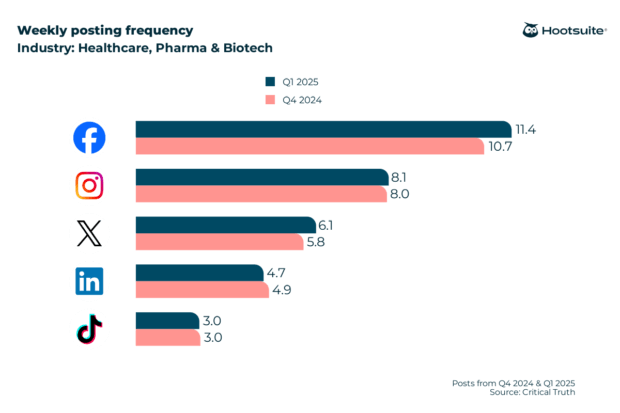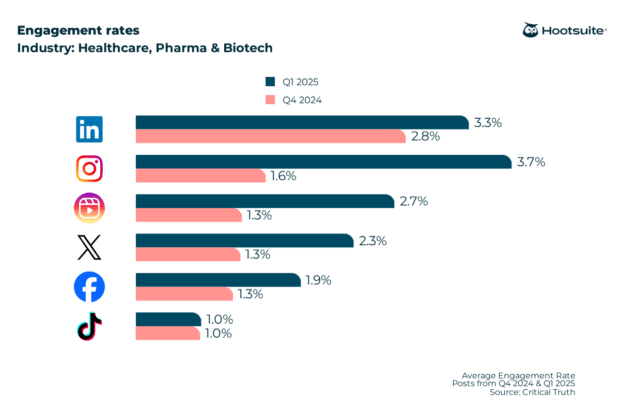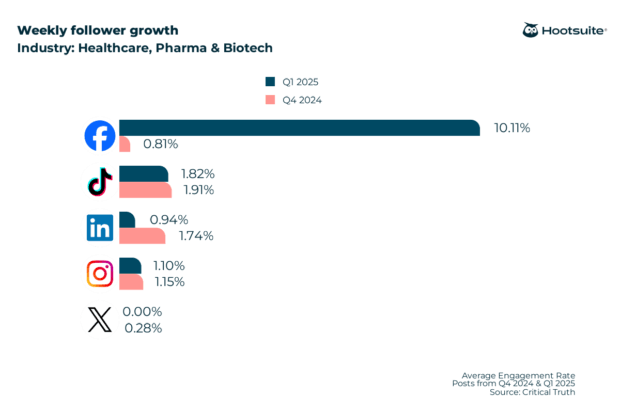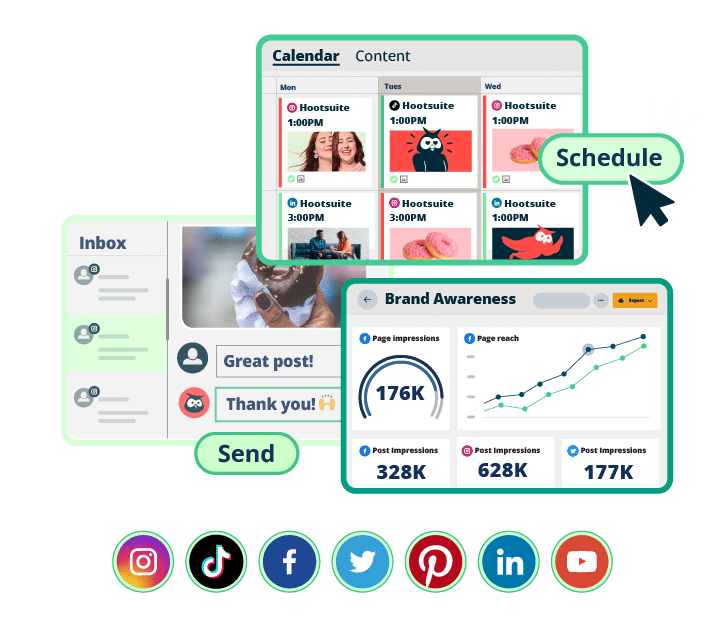The benefits of using social media in healthcare are tangible: 57% of people say a hospital’s social media presence “strongly influences” their choice of where to access healthcare, and 81% associate a strong social presence with having cutting-edge technology.
But it can be complex to navigate compliance with laws and regulations in your region on top of producing high quality content.
Keep reading to learn why using social media in healthcare marketing is worth the work and get tips to succeed on social media in 2025. Plus, we’ve included a ton of up-to-date, industry-specific data that will give you an idea of how your social strategies are doing.
Bonus: Download a free social media toolkit for healthcare professionals with post ideas, templates, and more. Save time and get inspired!
Build a positive brand image
Healthcare organizations aren’t usually what most people associate with brands, like remembering a Coca-Cola commercial from their childhood. But brand recognition and perception is even more important for healthcare organizations because a provider-patient relationship centers around trust.
Posts demonstrating your values go a long way toward building trust with both prospective patients and employees, like this Reel from St. Jude’s:
Raise public awareness of health issues and best practices
For public health bodies like health authorities or government offices, social media is a powerful tool to reach the majority of your region’s population relatively inexpensively.
For those in the B2B health space, social media is both a way to promote your products to healthcare organizations and help contribute to public health literacy with educational content.
Stay up to date with industry news
Besides sharing your own news, social media keeps you informed about what your competitors and industry as a whole are up to.
With a social listening tool like Hootsuite, you can search for keywords across billions of online sources in seconds. More than search results, Hootsuite Listening shows you relevant conversations in context, including measuring positive vs. negative brand sentiment and the most popular content for your keywords.

For even more powerful features, our upgraded listening tracks historic brand sentiment over time, identifies top influencers in your industry, expanded audience demographics, and much more. Interested in a free demo? Book one now.
Discover your audience’s knowledge gaps
Knowing what your audience wants is half the battle of creating content. Use social media to find out what your audience wants to learn more about, and any potential misinformation you can clear up.
A lot of this can happen directly on your social profiles:
- Ask questions: Either in post text or using platform-specific features like polls.
- Reply to comments: Dig deeper into conversations to find those knowledge gaps and learn about your audience one-on-one.
Hootsuite Inbox makes it easy to see and respond to comments across social networks in one place, and manage them in a streamlined way with your team.

Social listening can also identify key public health concerns and sentiments about current outbreaks or health events.
Studies have found analyzing social media posts provides a comparable level of accuracy as national health surveys, which usually take a lot of time to put together.
Hootsuite Listening makes getting unlimited, accurate insights 24/7 easy by simultaneously searching billions of online sources at once.
By searching for this information, you can develop content that answers people’s questions and serves as an educational resource, in addition to building your brand.
Boost engagement
Being active on social media helps boost your engagement and, as a result, grow your profiles. Comments from your audience should be welcomed (and replied to!), although there may be a concern of people posting inaccurate information you don’t want to be associated with.
Hootsuite Listening can help here, too. It helps find posts to comment on to forge new relationships, while also scanning comments on your own content to filter spam and problematic content.
Ochsner Health successfully used social listening to combat misinformation and build its brand awareness, resulting in a 129% increase in engagement and a 5% website traffic boost from social media.
We’ve always tried to stay on top of comments, but the process was manual. Talkwalker by Hootsuite automates this, crawling through social platforms to spot issues. We have far more robust processes in place for funneling potential risks through the organization.
– Amber Welch, Assistant Vice President, Digital Content and Creative Media, Ochsner Health
Support hiring
Attracting the top medical professionals to work for you helps shape the future of your organization. Additionally, in areas with healthcare labor shortages, social media can help you advertise, recruit, and retain employees in competitive markets.
The main ways to support hiring with social media are to:
- Run social media ads for open positions or general applications.
- Post open positions and link to the application.
- Post about what it’s like to work for your organization, including employee stories, notable achievements, employee anniversaries, and other “behind the scenes” content.
- Have a “pinned post” (on platforms with this feature) directing people to top links on your website, such as the latest public health info and your careers page.
Plus, of course, the brand-building effect of regularly posting on social media will keep you at the top of mind when people are looking to switch jobs or enter the healthcare field after graduating.

Attract new patients
As mentioned earlier, when it comes to accessing healthcare, over half of consumers are influenced by social media.
In a survey, 12.5% of healthcare organizations said they’ve directly attracted new patients from social media.
How often should you post on social media in healthcare?
Every organization’s posting schedule is unique, and you should test different posting frequencies to find out what works best for your audience. That said, these industry-specific stats will help you find a data-informed starting point.
Our research found that healthcare, pharma, and biotech organizations post on Facebook more often than on any other social platform — roughly 11 times per week.

Average engagement rates in healthcare
Wondering if your engagement rates are high enough? Here are the industry averages across all major social networks as of April 2025:
- LinkedIn: 3.3%
- Instagram: 3.7%
- Instagram Reels: 2.7%
- X (Twitter): 2.3%
- Facebook: 1.9%
- TikTok: 1.0%

Follower growth rate in the healthcare industry
If your social media strategy revolves around growing your audience, make sure you’re setting realistic goals. Here is how other healthcare organizations are doing as of Q1 2025:
- Facebook: 10.11%
- TikTok: 1.82%
- LinkedIn: 0.94%
- Instagram: 1.10%
- X: 0.00%

For more healthcare-specific research, including the best times to post, the most engaging content formats, and network-specific breakdowns of the stats above, check out our dedicated post on healthcare social media benchmarks.
In our recent survey, 63% of healthcare social media managers say keeping up with regulations makes their job tougher. You’ll need to check which federal and regional laws apply to your organization, as well as any social media rules your profession’s licensing authority requires.
Below, we’ve summed up the general regulations that apply to most healthcare organizations, but it’s always wise to consult your legal team with any questions.
HIPAA
HIPAA is the most important regulation to be aware of for U.S.-based healthcare organizations on social media. HIPAA is a federal law regulating the collection and privacy of personal health information.
Essentially, HIPAA means you can only use and disclose patient information during normal healthcare operations, like treating a patient. “Patient information” includes anything that can personally identify someone, from their name, birthday, or account number to things like their web IP address or license plate — 18 total identifiers are covered under HIPAA.
In addition to keeping patient information confidential, HIPAA also requires healthcare organizations to use specific security measures, such as each employee having their own login account and storing records securely.
HIPAA was first signed into law in 1996, pre-dating the modern social media age, though it is updated at least every few years to keep pace with technology and security best practices.
For more information on HIPAA, see the U.S. government’s official website and HIPAA news and updates.
Of note, several U.S. states have passed their own privacy laws that are stricter than HIPAA, including the California Consumer Privacy Act and the Colorado Consumer Privacy Act. They do exclude some types of healthcare organizations but you will need to verify whether or not they apply to you.
FDA
The FDA regulates data privacy and safety of medication, food, and many other health or beauty products. The federal organization also oversees human safety during clinical trials, requires financial disclosures in research, and regulates radiation-emitting devices, which include everything from MRI machines to microwaves.
For more information on current regulations, see their FDA for Industry or FDA for Health Professionals portals.
PIPEDA and Canadian privacy laws
Like the United States, Canada has its own healthcare privacy regulations. Federally, those fall under PIPEDA, which protects consumers’ personal data across all private-sector businesses, including some healthcare organizations.
Whether or not it applies to you is a little more complicated. Several provinces have privacy laws that supersede PIPEDA (Alberta, British Columbia, and Quebec), so those provincial laws apply instead, with a few exceptions.
PIPEDA regulates the private sector, so while Canadian hospitals may be exempt, private sector providers — mental health counselors, physiotherapists, and many others — are not.
Four Canadian provinces also have healthcare industry-specific data privacy laws that apply alongside PIPEDA for healthcare organizations in New Brunswick, Newfoundland and Labrador, Nova Scotia, and Ontario.
It’s best to consult with a professional advisor about which laws apply to your organization, although you can start with this list of current privacy laws in each province.

Create and publish posts. Talk to patients and prospects. Measure ROI. Save time and grow faster.
Book a demoCollege or regulatory body laws
While these may not be legally binding laws, it’s best practice to follow the social media guidelines set by your licensing or regulatory body. In some cases, failure to do so may jeopardize your ability to practice in your region.
For example, the British Columbia College of Physicians and Surgeons explicitly lists what doctors can and cannot do when advertising or communicating with the public, including on social media.
Most of these regulations are likely to be in line with existing current federal or regional laws, but ensure you’re aware of any social media-specific guidance from your regulatory body before you begin posting on social media.
Here are a few examples of what to avoid in healthcare social media marketing.
Sharing patient stories with identifying information
Not only would this be a violation of HIPAA patient confidentiality regulations — it could also erode trust in your organization.
While no medical professional has likely done this with ill intent, it’s important to note it does happen: in a review of posts made by healthcare professionals on X (formerly Twitter), 2% included a patient name. For anonymous stories, friends or family of the patient could likely identify their loved one’s story in 32.1% of posts.
If you’re not sure if what you want to post is anonymous enough, it’s best to avoid potentially sensitive information altogether.
Negative remarks
Not using the most current medical language may imply a bias or judgment, even if you didn’t mean to come across as judgmental at all.
An example could be referring to substance use disorder issues with (unintentionally) stigmatizing language which may alienate potential patients. The National Institute of Health has some great advice on science-based language relating to this example, though there are parallels for many other health topics.
Unproven claims
We don’t think you’re going to say something on social media if it hasn’t been clinically proven. But even saying something like, “XYZ Product works for most people,” without citing your source can land you in hot water with the FTC.
What counts as most: 90%, 75%, 51%? Which study verified that claim? While you don’t need footnotes in a social media post, be prepared to back up any claims with evidence if asked.
Misleading ads
Healthcare ads need to follow much stricter rules than regular consumer ads. The main key is ensuring they are clear, accurate, and not misleading in any way, even by way of omission.
In addition to being governed by privacy laws like HIPAA, healthcare ads are also regulated by the FDA and FTC in the United States and other government firms worldwide.
A few resources to reflect on when crafting ads:
- FTC: Health Products Compliance Guide
- FDA: Advertising and Promotion Guide
- Health Canada: Advice for advertising health products
- The Canadian Code of Advertising Standards
There are many ways to be successful on social media in healthcare while remaining compliant with laws.
1. Share edu-taining content
Educational + entertaining = edutaining. Just because you’re in healthcare, doesn’t mean you can’t be fun.
If only Joey Tribbiani had seen this Reel from Cleveland Clinic, it would’ve been a very different day at the beach for Monica and Chandler…
People say the top reason they use social media is to be entertained and 53% wish brands were more relatable. Across all industries, people dislike brands who are too self-promotional, post low-quality content, or don’t engage with their followers.
Foster engagement by focusing on entertaining your audience. You can still educate at the same time.

A great example of mixing education and entertainment is the Mayo Clinic Minute series. The Reels are fast-paced, engaging, and informative.
2. Don’t fear AI
62% of people say they’re less likely to engage with or trust AI generated content, although that varies widely by generation. Gen Z is, predictably, more likely to trust AI content, whereas baby boomers are the least likely.
Even so, AI use is skyrocketing across industries, including healthcare, with some organizations reporting a 422% jump in usage vs. 2023 for some types of AI tasks.

You can still use AI content creation tools to save time without sacrificing trust by ensuring you have an approval workflow to fact-check content before publishing.
Hootsuite’s OwlyWriter AI can draft new posts or repurpose existing content into posts tailored for each platform in just a few clicks. Since it’s built into Hootsuite, you can draft and schedule weeks’ worth of content in minutes — plus collaborate with your team and assign approvals before going live, all in one place.

3. Run regular compliance audits
Besides checking for regulatory and ethical compliance, social media audits uncover:
- Your top-performing content
- Audience demographics
- What your competitors are doing (and how you can do it better)
- Growth by social media platform
- Current social media strengths and opportunities
We’ve got a full step-by-step on running a social media audit, complete with a free template.
4. Stay secure
Every company should have a thorough review process before anything goes public on social media, especially in sensitive industries like healthcare. Using compliance software like Proofpoint takes approval workflows a step further.
Proofpoint connects to and monitors your social media accounts through Hootsuite to check for brand compliance and flags and/or removes posts that may violate policies and laws. It works automatically while keeping accurate digital records for a transparent and compliant digital presence.

Proofpoint is available as an integration for Enterprise Hootsuite customers. Learn more about setting it up.
5. Focus on a few platforms
49% of healthcare organizations say their biggest social media challenge is related to the cost or time it takes to maintain their presence on multiple platforms.

So… don’t! You don’t need to be on every social platform out of obligation. Just because the average person uses seven social media platforms per month doesn’t mean you need to try to meet them on all of them. Focus your time and budget on the one or two platforms that are driving the most results according to your social media goals.
For example, Northwestern Medicine prioritizes video content for TikTok and Instagram rather than trying to “do it all.” Their videos make excellent use of tools to hold the viewer’s attention, like this countdown timer, which increases the likelihood of people watching the entire video.
6. Measure your ROI
Evaluating the ROI of social media marketing is a challenge for many brands, healthcare organizations included. 69% of those we surveyed said they were concerned about their social media ROI.

Part of that concern is likely because 64% of organizations say their primary ROI metric is engagement, and 51% say follower count.
But unless you’re posting content that people want to engage with and see more of, neither of those metrics will budge much. Which comes back to focusing on “edutaining” content.
If your goal is engagement, post informative, enjoyable content.
If your goal is public health awareness, post informative, enjoyable content.
If your goal is getting leads, post informative, enjoy— okay, you get it.
Engagement is important and should be something you track as part of your regular analytics review, but it isn’t everything. Define your goals for social media, track progress, and above all… post informative, enjoyable content.
Hootsuite is the most trusted social media management tool for healthcare organizations. Schedule content and reply to comments across all your social profiles, use powerful social listening tools, and stay compliant with Proofpoint security — all with ROI-proving analytics to push growth to the next level. Try it today.






